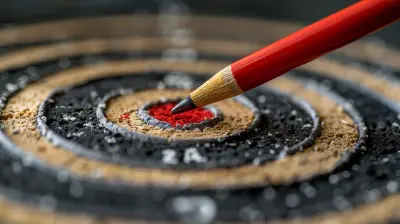Study Habits That Will Help You Succeed in Every Subject
23 September 2025
Studying can sometimes feel like trying to juggle flaming swords—stressful, overwhelming, and slightly dangerous if you're running on three hours of sleep and caffeine. But don’t worry! With the right study habits, you can turn your academic journey into a smooth, productive, and even enjoyable ride.
So, whether you're tackling math equations, memorizing history dates, or deciphering Shakespearean English, these study habits will help you ace every subject. 
1. Create a Study Routine (And Stick to It!)
Let's be honest—most of us have tried the “last-minute cram session” strategy, and while it might work sometimes, it’s definitely not a recipe for long-term success. Instead, set up a regular study routine.How?
- Pick specific times for studying each day.- Choose a distraction-free study space.
- Follow the Pomodoro Technique: Study for 25 minutes, take a 5-minute break, repeat.
- Review material regularly—don’t wait until the night before an exam!
Having a fixed routine trains your brain to be in "study mode," making it easier to absorb information. 
2. Take Effective Notes (Not Just Scribbles!)
Ever looked at your class notes and thought, What on earth did I write here? Yeah, we've all been there. The key is to take clear, structured, and useful notes that you can actually understand later.Try These Techniques:
- The Cornell Method: Divide your page into three sections—main notes, key points, and a summary.- Mind Maps: Great for visual learners! Draw connections between ideas.
- Highlight Key Information: But don’t turn your notes into a neon rainbow.
Pro tip: Reviewing your notes within 24 hours helps reinforce the information in your brain! 
3. Find Your Learning Style
Not everyone learns the same way. Some of us are visual learners, while others need to hear information to process it. Knowing your learning style can boost your efficiency.Different Learning Styles:
- Visual Learners → Use diagrams, charts, and color-coded notes.- Auditory Learners → Listen to lectures, record and replay notes, or study with a friend by explaining concepts aloud.
- Kinesthetic Learners → Engage in hands-on learning, use flashcards, or walk around while memorizing.
Experiment with different methods to find what clicks for you! 
4. Teach What You Learn
If you can explain a concept to someone else in simple terms, congrats—you truly understand it! This method, called the Feynman Technique, is a game-changer.How to Do It:
- Pick a concept you're studying.- Explain it as if you were teaching a 5-year-old (simplify it as much as possible).
- Identify gaps in your understanding and go back to review.
Teaching forces you to organize information and make it crystal clear in your mind. Bonus points if you teach a friend or family member!
5. Ditch Multitasking, Focus on One Thing at a Time
Sure, you think you can watch Netflix, scroll Instagram, and study for your chemistry test at the same time. But newsflash: multitasking is a myth when it comes to effective studying.Why?
- Splitting focus reduces retention and comprehension.- You’ll take longer to finish your work.
- Your brain gets exhausted faster.
Instead, give your full attention to one task at a time. Your brain will thank you!
6. Make Studying Fun (Yes, It’s Possible!)
Studying doesn’t have to be a boring, soul-sucking experience. There are plenty of ways to make it enjoyable:Spice Up Your Study Sessions:
- Turn Information into a Game → Use flashcard apps like Quizlet.- Use Mnemonics → Create fun acronyms to remember lists (e.g., PEMDAS for math).
- Reward Yourself → Treat yourself to a snack or break after completing a study goal.
When studying feels less like a chore and more like a challenge, you'll stay more engaged.
7. Get Plenty of Sleep (Seriously, Stop Pulling All-Nighters!)
Sleep isn't just for lazy people—it’s when your brain actually processes what you've learned. Skipping sleep to study longer is like trying to drive a car with no gas.Why Sleep Matters:
- Improves memory retention.- Boosts concentration and focus.
- Helps you avoid mental fatigue.
Aim for 7-9 hours of sleep per night, especially before an exam. Trust me, your brain will perform way better!
8. Use Past Papers and Practice Tests
Want to ace your exams? Practice, practice, and more practice! Past exam papers and sample questions help you get familiar with the format and type of questions you’ll face.How to Use Them Effectively:
- Time yourself while attempting practice papers.- Identify weak areas and focus on improving them.
- Review mistakes carefully and learn from them.
Consider practice tests your “sneak peek” into the real exam!
9. Stay Organized to Reduce Stress
A cluttered study space = a cluttered mind. Being organized helps you stay on top of your work and reduces academic stress.Ways to Stay Organized:
- Keep a planner or use a study app to track assignments.- Organize notes by subjects and topics.
- Set deadlines for studying and stick to them.
The more structured you are, the less overwhelmed you’ll feel!
10. Stay Positive and Believe in Yourself
Your mindset plays a huge role in your academic success. Instead of saying, I’m terrible at math, switch it to I’m improving in math every day.Boost Your Confidence By:
- Setting achievable study goals.- Celebrating small wins.
- Surrounding yourself with supportive people.
A positive attitude makes studying easier and helps you stay motivated, even when the material gets tough.
Final Thoughts
Succeeding in school isn’t about being the smartest person in the room—it’s about having the right habits and strategies. With these study habits, you’ll be well on your way to mastering every subject without burning out.So, why wait? Start applying these tips today, and watch your grades (and confidence) soar!
all images in this post were generated using AI tools
Category:
Study TipsAuthor:

Olivia Lewis
Discussion
rate this article
1 comments
Sydney McLoughlin
Great insights on effective study habits! Implementing these strategies can truly enhance academic performance across all subjects.
October 2, 2025 at 11:39 AM

Olivia Lewis
Thank you! I'm glad you found the insights helpful. Wishing you success in your studies!


